Sumatra Travel Guide
Roughly the size of California, Sumatra is a beautiful island with volcanoes and hot springs, lakes and rivers, rolling green foothills, plantations and wild jungle scenery. Many reserves protect the island's wealth of indigenous wildlife, and elephants, tigers, rhinos, orangutans and tapirs can be seen on organised safaris within protected reserves.
The majority of the population lives in the foothills, plateaus and highlands of Sumatra, working as farmers. The entire island was once covered in dense rainforest, but today most has been destroyed by the need for agricultural land, which is the country's prime earner. Key exports include palm oil, rubber, tobacco, coffee and tea.
The island is home to numerous peoples and cultures. Among them are the Muslim Minangkabau and the great highland people, the Batak, who inhabit a fertile volcanic plateau and have a language, dress, religion, architectural style and culture all of their own. Lake Toba, the spiritual centre of the Batak, is a major tourist destination lined with resorts. The busy hill town of Bukittinggi is the hub of the Minang culture and is surrounded by spectacular scenery.
This island has plenty of fine scenery, wildlife, natural resources, cultural diversity and extraordinary architecture to offer visitors. Though not as popular a destination as neighbouring Bali or Jakarta, Sumatra is an increasingly fashionable eco-tourism destination, and cycling or riding a scooter through the mountains and valleys can be a great way to take in the astonishing natural beauty.
Things to do in Sumatra
Though perhaps not the first stop on many travellers' Indonesian itineraries, Sumatra is a hugely popular destination that boasts some fantastic attractions and activities. Depending on the pace visitors want to set, a trip to one of the Mentawi islands, Batu or Nias Island is a must, as they are fantastic locations for surfing, windsurfing and scuba diving. Those wanting something a little more relaxing will love a cruise down the Siak River.
The holiday resort of Lake Toba in the north makes the perfect location for a relaxing holiday break, while the glistening Lake Maninjau offers retreat from the frenetic outside world. A hike to the Mertua Waterfall in Pekanbaru is a must for all nature lovers, as is a visit to the Kerinci Valley and National Park, which boasts a remarkable collection of Sumatran Rhinos. For a brush with orangutans, travellers should visit the Gunung Leuser National Park in the north or, for the ultimate wildlife experience, the Burbak Wildlife Reserve near the strait of Melaka, where they can view clouded leopards, Malayan sunbears, otters and gibbons.
Bukittinggi, which served as headquarters for the Japanese army during WWII, is worth exploring to visit the King Palace, Tuo Belimbing Mosque, or even Lake Singkarak. With all these great attractions and so much more, visitors will find there is more to this popular island than just its abundant natural beauty.

Bukit Lawang
The little village of Bukit Lawang is situated on the eastern banks of the pretty Bahorok River, facing one of the grandest forest areas in South East Asia, the Mount Leuser National Park. Its major attraction, the Orangutan Rehabilitation Centre, helps orphaned orangutans that have been displaced because of land clearing, or rescued from captivity, and teaches them the necessary skills to survive in the wild. Visitors have an opportunity to view the apes twice daily when they come swinging through the trees to collect the bananas and milk left on feeding platforms in the forest. Jungle trekking and tubing down the river are other popular activities.
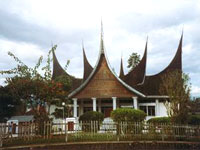
Bukittinggi
Bukittinggi, or 'high place', is situated on a hill and set among majestic mountains, green plantations and rice terraces. One of the friendliest and most easy-going cities in Sumatra, it is home to the Minangkabau people and the area is steeped in the Minang culture, which is Muslim and strongly matrilineal. One of the features of the town is the characteristic architecture: wooden houses with curved roofs soaring to a point representative of buffalo horns and decorated with beautiful wooden carvings. Nearby Mount Merapi is an active volcano that can be reached on a beautiful hike.
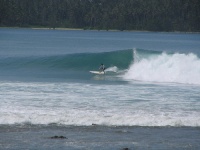
Nias Island
Famed for its right-hand reef breaks, Nias is a key surfing destination for many travelling through the area, with the best known surf spots being Sorake Bay and Lagundri Bay. This fascinating island also boasts a rich cultural history, featuring prehistoric remains that are thought to date back to the megalithic Stone Age. Tourists visiting Nias Island can enjoy traditional festivities such as the war dances performed by locals, and the hauntingly beautiful local music, which is mostly sung by women. Popular activities other than surfing include scuba diving and snorkelling in the clear waters, which brim with rich marine life.
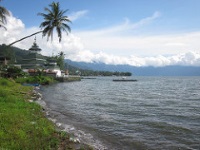
Lake Maninjau
Lake Maninjau is set like a burning sapphire stone in the crater of the mountain and is a spectacularly beautiful place to relax and unwind. It is a caldera lake, located in west Sumatra, and is thought to have been formed by a volcanic eruption around 52,000 years ago. The lake is set at about 1,545 feet (471m) above sea level, and the average temperature of the water in the lake is around 86F (30C). Visitors can enjoy cycling the 37-mile (60km) circumference of the lake, or plodding through the neighbouring rice paddies while others can swim, canoe and hike the surrounding mountains or explore the local villages.
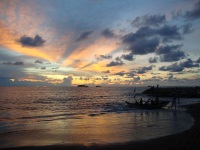
Padang
The capital of Sumatra, Padang offers a compact and enjoyable cross-section of Sumatran life and its various cultures. Many surfers stop here on their way to the Batu or Mentawi Islands, but the town itself boasts a few noteworthy attractions such as the Adityawarman Museum, which features a collection of antiques, and the cultural centre where locals perform traditional dances on Sundays or even pencak silat (martial arts). Many people come here for the markets, for which Padang is famed, but Padang Beach is also popular for its spectacular sunsets and hundreds of colourful food stalls.
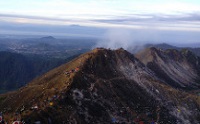
Berastagi
The town of Berestagi is famed not only for its passion fruit, but also for the two active volcanoes on its doorstep: Gunung Sibayak and Gunung Sinabung. Gunung Sibayak boasts fantastic hot springs whose warm waters are not only open to the public, but are also believed to have therapeutic properties. More active travellers can climb this mountain, earning breathtaking views over the island of Sumatra from the top. This is the most commonly climbed volcano in Sumatra as the hike to the top is comparatively easy, with beautiful and unusual scenery to enjoy along the way.
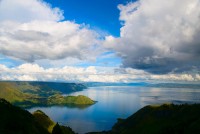
Lake Toba
The holiday paradise of Lake Toba is embedded in the northern highlands of Sumatra and is surrounded by steep and fertile mountains. Filling in a giant volcanic crater, the lake has depths of up to 1,680 feet (525m) in places. In the middle of Lake Toba sits the jade-green island of Samosir, which is thought to be the origin of the friendly Batak people. Evidence of their culture and traditions is visible in the little Batak villages, with their characteristic curved roofs, and the traditional dance performances at Simanindo's Batak Cultural Centre. There are also several hot springs near Pangururan, which attract visitors.
Sumatra Climate and Weather
The Indonesian climate is tropical. The warm waters of the ocean surrounding the archipelago ensure fairly constant temperatures on land and there is little seasonal variation. There is also very little difference in daylight hours from season to season.
Sumatra's weather is typical for Indonesia, but temperatures can often be lower than expected in the highlands. This slightly cooler and less humid highland climate can be a great relief and is good for hiking and other adventurous activities. The average daytime highs in Sumatra range from 72F to 86F (22C to 30C) while the rainfall differs from region to region and humidity levels are high in the lowlands. There are two main seasons: the dry season runs from February to August; and the wet season from September to January.
The climate of Indonesia is dominated by heavy monsoon rains, which generally occur between October and April, often causing damage and making local travel difficult (the rainy season is also the worst time for some mosquito-borne diseases). The best time of year to visit Sumatra is any time during the dry season.
Indonesia travel info
Electricity
Electrical current is 230 volts, 50Hz. A variety of plugs are in use, including the European two-pin.
Language
Bahasa Indonesia is the official language, but many dialects are spoken. English is widely understood in Jakarta and tourist resorts.
Money
The Indonesian currency is the Rupiah (IDR). Foreign currency can easily be exchanged at banks, hotels and money changers in major tourist destinations; the US dollar is the most accepted currency. Travellers should ensure that foreign bills are in good condition, as creased and torn notes may be refused. The best exchange rates in Indonesia are generally found in major centres such as Jakarta and Bali. Visa and Mastercard are accepted at more expensive hotels and restaurants, though smaller businesses may not have card facilities (especially in remote areas). ATMs are available in main centres. Small change is often unavailable so travellers should keep small denomination notes and coins for items such as bus fares, temple donations and soft drinks.
Tipping
Most midrange and all top-end hotels and restaurants add 21 percent to the bill for tax and service (called 'plus plus'). Where it is not included, a tip of 10 percent of the bill is appreciated. Tipping taxi drivers, masseurs and porters is not mandatory but, if travellers do choose to, a gratuity of IDR 5,000 to IDR 10,000 is appreciated.
Health
There are a number of health risks associated with travel to Indonesia and medical advice should be taken at least three weeks before departing. Yellow fever vaccinations are required for those coming from yellow fever areas. Vaccinations for hepatitis A and hepatitis B are recommended, and a typhoid vaccination may be recommended for those spending time in rural areas. Malaria is a year-round risk in much of Indonesia, but not in Jakarta or the tourist resorts of Java and Bali. The dengue fever mosquito is found throughout Indonesia and visitors should be aware of a significant increase in reported cases of dengue fever throughout the country during the rainy season. Outbreaks of chikungunya fever, also from mosquitoes, have occurred regularly in Indonesia in recent years. It is recommended that pregnant women, or women planning on becoming pregnant, should postpone their trip wherever possible, as Indonesia has recently been classed as a moderate risk zone for the Zika virus.
Travellers' diarrhoea is a major risk; visitors should only drink sealed bottled water and avoid dairy products, uncooked meat, salads and unpeeled fruit. Poor sanitation and eating contaminated food can increase the risk of cholera, typhoid and other diseases. The standard of local medical care is poor and very expensive. It is essential to take out comprehensive medical and travel insurance.
Safety
There is a risk of terrorism directed against foreigners throughout the country. It is recommended that visitors contact their foreign office for the latest travel advice before travelling to Indonesia. The security situation remains unsettled in central Sulawesi and foreigners are advised to avoid parts of Maluku, particularly Ambon. Visitors are also advised to be cautious if travelling to Aceh. Religious violence and unstable politics are an ongoing problem in Indonesia and travellers should keep an eye on current affairs.
Indonesia has a high crime rate and theft and petty crime is common in tourist areas and on public transport. Credit card fraud is on the increase. Flooding and landslides occur frequently during the rainy season between December and March. The country is also located on the volatile seismic strip named the "Ring of Fire", and as a result is often subject to earthquakes, volcano eruptions and occasionally tsunamis. Not all Indonesian airlines are considered safe and travellers should do some research into reputable airlines before booking.
Local customs
Indonesian people are generally friendly and polite and, while they understand that Western culture is different from their own, it will be appreciated if their customs are respected. Their religious customs should also be respected, particularly during the holy month of Ramadan, when eating, drinking and smoking during daylight hours should be discreet, in accordance with the Muslim culture. Visitors should always be polite and avoid public displays of affection. It is considered impolite to use the left hand for passing or accepting things. Appropriate dress is important in places of worship and women should dress conservatively, covering the shoulders and legs. The concept of 'saving face' is very important and public displays of anger, ridicule and blame are considered extremely vulgar and bad mannered. Gambling is illegal. The Indonesian government also adopts a zero tolerance approach to those engaged in illegal activities, such as dealing or consuming drugs while in the country, or the killing or illegal trading of endangered animals. Offenders have been given lengthy prison sentences, and have even been sentenced to death.
Doing business
Due to the hot and tropical climate, formal business attire in a light, cool material is the best option. Indonesia is largely Muslim so dress should be conservative, especially for women. Business cards are often exchanged and it is important to present and receive them with a slight bow and in both hands, or the right hand only, as the left is considered unclean. Some Indonesian names can be long and hard to pronounce and making an effort to get it right when greeting someone will be appreciated. It is best to use formal titles such as Doctor, or 'Bapak' for Mr and 'Ibu' for Madam. Business hours vary; government offices are usually open from 7am to 3pm and small businesses from 8am or 9am to 4pm or 5pm.
Duty free
Travellers to Indonesia who are over 18 years of age do not have to pay duty on 25 cigars or 200 cigarettes or 100g tobacco; alcohol up to 1 litre; perfume for personal use; and personal goods to the value of US$250 per passenger or US$1,000 per family. Travellers not entering on a tourist visa will have to pay duties for photo and film cameras unless these have been registered in their passport by Indonesian Customs. Electronic equipment may not be imported to the country. Prohibited items include Chinese medicines and prints, narcotics, firearms and ammunition, pornography, cordless telephones, fresh fruit or goods to be used for commercial gain.
Communications
The international access code for Indonesia is +62. The outgoing code is 00 followed by the relevant country code (e.g. 0044 for the UK). Buying a local SIM card is a good option as international roaming fees can be expensive. Free WiFi is available in most cafes, restaurants and hotels in main cities, towns and tourist areas.
Passport & Visa
Passengers to Indonesia of most nationalities can obtain a 30-day visa on arrival, provided that they arrive at a major Indonesian airport, their passport contains at least one unused visa page for the visa-on-arrival sticker, they are holding return or onward tickets, and the necessary travel documentation for their next destination, and they can show proof of sufficient funds to cover their stay in Indonesia (at least USD 1,000 or a valid credit card). The cost of a 30-day visa is USD 35. Those nationalities not permitted to purchase a visa on arrival must obtain a visa prior to their arrival in the country.
One visa extension, of a further 30 days, is possible, via an application made to the Immigration Office. Travellers should note that the day of arrival in Indonesia is counted as the first day of stay, and that fines will be levied against tourists who exceed their permitted period of stay. A yellow fever vaccination certificate is required.
It is highly recommended that traveller's passports have at least six months' validity remaining after the intended date of departure from their travel destination. Immigration officials often apply different rules to those stated by travel agents and official sources.
Entry requirements
US citizens must have a passport that is valid for at least six months from the date of their arrival in Indonesia. A visa is required.
UK citizens must have a passport that is valid for at least six months from the date of their arrival in Indonesia. A visa is required and must be used within 90 days after the date of issuance.
Canadian citizens must have a passport that is valid for at least six months from the date of their arrival in Indonesia. A visa is required and must be used within 90 days after the date of issuance.
Australian citizens must have a passport that is valid for at least six months from the date of their arrival in Indonesia. A visa is required and must be used within 90 days after the date of issuance. Extensions of stay are possible depending on the type of visa.
South African citizens must have a passport that is valid for at least six months from the date of their arrival in Indonesia. A visa is required.
Irish citizens must have a passport that is valid for at least six months from the date of their arrival in Indonesia. A visa is required.
New Zealand citizens must have a passport that is valid for at least six months from the date of their arrival in Indonesia. A visa is required.
Useful contacts
Indonesian Tourism Authority: www.indonesia-tourism.com
110 (Police); 113 (Fire); 118 (Ambulance)Embassies / consulates in other countries
Indonesian Embassy, Washington DC, United States: +1 202 775 5200.
Indonesian Embassy, London, United Kingdom (also responsible for Republic of Ireland): +44 (0)20 7499 7661.
Indonesian Embassy, Ottawa, Canada: +1 613 724 1100.
Indonesian Embassy, Canberra, Australia: +61 (0)2 6250 8600.
Indonesian Embassy, Pretoria, South Africa: +27 (0)12 342 3350.
Indonesian Honorary Consulate, Dublin, Ireland: +353 852 491 465.
Indonesian Embassy, Wellington, New Zealand: +64 (0)4 475 8697/8/9.
Embassies / consulates in Indonesia
United States Embassy, Jakarta: +62 (0)21 3435 9000.
British Embassy, Jakarta: +62 (0)21 2356 5200.
Canadian Embassy, Jakarta: +62 (0)21 2550 7800.
Australian Embassy, Jakarta: +62 (0)21 2550 5555.
South African Embassy, Jakarta: +62 (0)21 2991 2500.
Irish Embassy, Singapore (also responsible for Indonesia): +65 6238 7616.
New Zealand Embassy, Jakarta: +62 (0)21 2995 5800.



